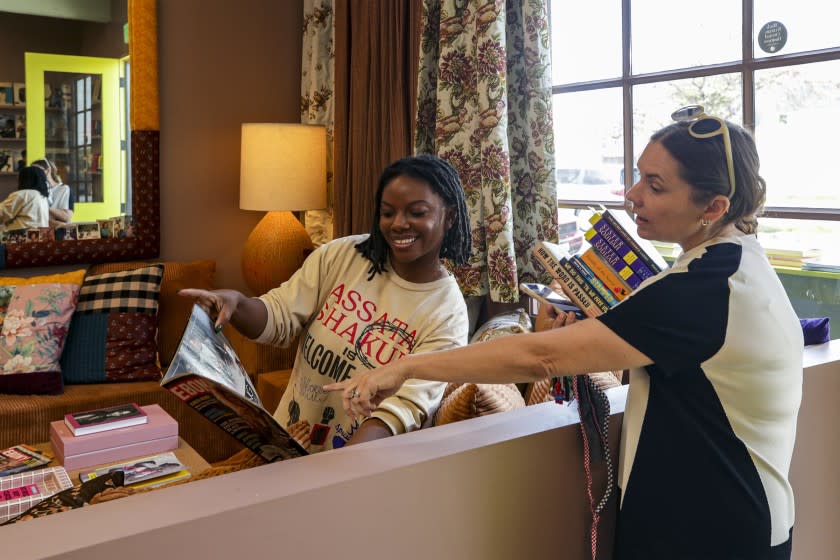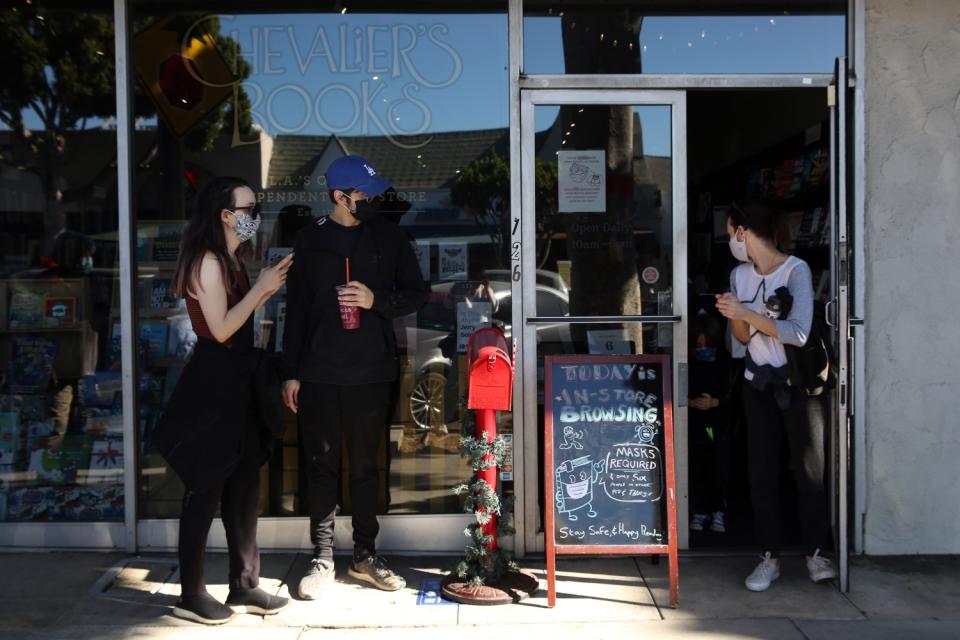How L.A.'s indie bookstores survived the worst of the pandemic

For the first time since the pandemic swept through the United States, Jazzi McGilbert saw glimmers of normalcy last month.
The staff members of Reparations Club, McGilbert’s bookstore near Jefferson and Crenshaw boulevards, are taking actual vacations instead of time off for COVID-19 testing or “playing-it-safe sick days,” McGilbert said. The store’s first in-person event in more than a year is set for Wednesday; conferences and book fairs are on the horizon; and customers are starting to emerge from a long stretch of home quarantine.
“I've been ordering online all year and this is my first time visiting in person!” customers have been telling McGilbert. And they’ve been asking about the return of their Saturday-morning-cartoons-with-cereal watch party.
It’s been more than a year of agonizing uncertainty for indie booksellers in Los Angeles and beyond. They have weathered multiple shutdowns, confusing mandates from the Centers for Disease Control and Prevention and drops in sales of 50% or more. Most have transformed their business models to account for social distancing and stay-at-home orders. Many feel hopeful about 2021 as sales climb back to 2019 levels and COVID-19 cases continue to fall, but there’s a new source of anxiety in a moment that should feel celebratory: California’s reopening this week.
“I feel trepidatious,” McGilbert said. “Our whole team is vaccinated. A lot of our customers, anecdotally, are vaccinated, but we’re still enforcing mask-wearing until it feels comfortable not to.”
Overall, she’s being judicious.
“We’ve always taken it slow and obviously following whatever city guidelines there are,” she said, “but we’re not in a rush to pretend that things are normal.”
Julia Cowlishaw, chief executive of Book Soup and Vroman’s, is “hopeful and uneasy” about the state’s reopening. She’s concerned about unvaccinated customers, virus variants and children under 12 who aren’t yet eligible for vaccinations.
“It will be devastating if there is an outbreak and businesses are required to retract,” she wrote in an email.
For booksellers like Cowlishaw, the winter COVID-19 surge was not only financially draining; it left psychological scars that can’t be easily covered over.
“It was scary,” she wrote. Despite taking precautions, a few employees tested positive, she said.

Two employees at Skylight Books in Los Feliz also tested positive for the coronavirus. Each time, the store was forced to close for a week — first in late December and then in late January — according to Mary Williams, the bookstore’s general manager. Only on Feb. 10 did the physical store reopen for good.
“It was really hard,” Williams said in a phone interview. “We had gotten all the way through the holidays without a single positive case on our staff.” After the second case, they closed to customers for two weeks.
Yet even before the devastating winter COVID-19 surge, some booksellers said they were on the brink of permanent closure. Rainy day funds, Paycheck Protection Program loans, rent deferrals and fervent community support — particularly during the holidays — helped immensely. For some, it wasn’t enough.
“At the first shutdown and during the winter surge/reclosings, we ran different scenarios for our projected cash flow and concluded we'll be screwed without outside assistance,” Alex Maslansky, co-owner of Stories Books & Cafe in Echo Park, wrote in an email.
Along with Brentwood’s Diesel and Hollywood’s Larry Edmunds Bookshop, among others, Stories launched a GoFundMe, which helped bridge the gap between the first and second PPP loans the business received.
Booksellers are anticipating a full recovery but still have a long way to go to cover last year’s losses. “It’ll be a while until we can balance out last year’s mess,” Maslansky said.
According to the American Booksellers Assn., the trade group for independent bookshops, 78 of its member stores have closed since March 2020, but 67 have opened, including non-traditional models like pop-ups and mobile bookstores.
“Independent bookstores here in California and nationwide are surviving and in many cases thriving during the pandemic,” Calvin Crosby, executive director of the California Independent Booksellers Alliance, said in an email. “[They] have shown they are tenacious and adaptable when threatened by predatory big boxes invading their towns, from the retail strip mining, from the giant online retailer, and even when facing a global pandemic.”
Crosby noted that some booksellers have seen pandemic sales exceed previous years. Web orders were a lifeline, spiking dramatically during shutdowns, COVID-19 surges and the holiday season.
For a while last year, McGilbert’s shop was operating 100% online while she looked for a new location for Reparations Club, which was formerly in Mid-City.
Over the past year, indie booksellers like McGilbert continued to make long-term plans — sometimes more easily, without storefronts to manage.
Chevalier’s in Larchmont Village relocated across the street this year after its lease ended; Malik Books, which specializes in African American literature, opened a second location in November inside the Westfield Culver City Mall; Village Well Books & Coffee started selling books online last May and officially opened its Culver City storefront in January.

Online sales continue to be robust, even as they ease back toward 2019 levels. McGilbert estimates that about 80% of all book sales are still web orders. Skylight Books, according to Williams, is receiving an average of 60 online orders a day, a big drop from the 120 during the first shutdown and the daily average of 230 in December. In-person sales have been making up the difference.
At Book Soup and Vroman’s, online sales are also still above pre-pandemic levels. To keep up with them, Vroman’s Pasadena recently partnered with the company Rollo to deliver to local customers.
Things are also looking up at Stories.
“We’re now keeping pace with our historical non-apocalypse, year-to-year increase,” said Maslansky. “As the city reopens, our in-store versus online sales are inversely proportional. People are back to discovering a book that chooses them from the shelf, rather than choosing a book from the website. We’re getting out of the red, and that light at the end of the tunnel may not actually be a train.”
As more customers are feeling comfortable shopping in person, booksellers are thinking of ways to entice casual browsers back into their businesses.
Vroman’s in Pasadena is planning to reopen its wine bar. And Chevalier’s Books in Larchmont Village is back to its usual promotional strategy: newsletter blasts, social media, curated window displays and regular (albeit mostly still virtual) author events.
But according to staff member Theresa Phung, the store hasn't needed to do much outreach.
“Customers are eager to get back into stores to buy books and enjoy the sunshine,” she wrote in an email. “Families in particular are ready to get their kids out there again so they can just be kids.” Chevalier’s recently had its first in-person book club for kids ages 9 to 11.
Other booksellers are sticking to virtual events for now, and some are experimenting with hybrid models, pop-up appearances and bookmobiles.

“We want to put a bookmobile together so that we can move it around the city and service our underserved communities,” said Malik Muhammad, founder and co-owner of Malik Books, the store specializing in African American books in the historic Baldwin Hills Crenshaw Mall. “We want to take the show on the road.”
The bookmobile serves another function. “Malik is not a spring chicken no more,” he said. “I’m 57 and books are heavy.”
A TV appearance on “The Ellen DeGeneres Show” in January with DJ tWitch has helped drive customers and traffic back to the Crenshaw location, which closed for six months and forced Muhammad to launch a GoFundMe. And for the past few months, he’s done on-air book reviews for Ryan Seacrest on 102.7 KIIS FM.
Other stores, like Skylight, are taking a quieter approach.
“We have a line so often that we feel like running any kind of large incentive would only increase the length of time people have to wait to come in,” Williams said. But they do plan to expand their hours and allow full in-store capacity soon after June 15. Masks will be optional for fully vaccinated customers, but the plexiglass screens at the register will stay.
Overall, those booksellers who have made it through the red days of winter express optimism, tempered by varying degrees of caution.
“I don't want to count all my eggs before they've hatched,” Phung said. “Running an independent bookstore can often feel like a year-by-year, if not month-by-month, game, and we're making sure to keep on our toes.”
McGilbert is keeping on her toes too, albeit for more specific reasons: support for Black-owned businesses like hers can come and go, she said.
“[Booksellers] are all definitely in community with each other, but there’s just some different hurdles to overcome as a Black-owned bookstore,” she said.
“Even all bookstores aren’t created equally. … It just feels like wave after wave and we are riding them as best we can, but I feel like a surfer more than a bookseller.”
This story originally appeared in Los Angeles Times.
